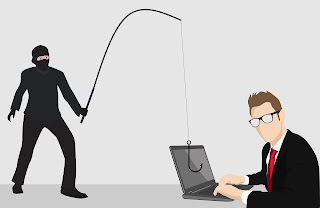Why phishing emails are bad for business
Have you heard about the UC San Diego Health data breach?
It
started with a phishing attack back in December, and now the personal info of
patients, students, and employees could be in the hands of cybercriminals. The
victims could face identity theft at any time.
A
CLASSIC EXAMPLE OF AN EMPLOYEE DOING THE EVIL BIDDING OF THE BAD GUY.
- Employee(s) took action as directed in the phishing
email.
- Those actions gave the hackers access to employee email
accounts.
- The hackers could access everything in the employee
email accounts.
WHY
IT’S BAD FOR BUSINESS
- The hackers can access any password reset links that
arrive via email.
- The hackers can access any multi factor authentication
codes that arrive via email.
- The hackers can send emails directly from your email
account and message your contacts requesting information or even changing
payment instructions.
WHAT
YOU NEED TO KNOW
- Sometimes malicious emails get delivered to the inbox.
- You need to carefully review emails before clicking on
links and opening attachments.
- The best way to catch a phishing email is to practice
catching phishing emails.
HOW
DO YOU PRACTICE CATCHING PHISHING EMAILS?
Send
your employee simulated phishing emails. This gives them the opportunity to
spot phishy behaviors and review links, attachments, and emails addresses. This
allows them to learn in a safe and controlled environment. Don’t make them wait
for the real thing to see how much they know.
Did
you know I can help you send simulated phishing emails to your employees? I can
manage your program for you or I can provide consulting to help you determine
knowledge gaps, plan your program, and set goals.
Book a complimentary discovery session today
to learn more.
Finally, looping back to the state of the data breach. UC San Diego Health says the breached data hasn’t been used yet… However, it should be noted that hackers often wait months or even years to use the stolen data. If you were a victim of this breach, you'll want to monitor your credit reports for at least two years. Honestly, in this day in age you should always been monitoring this.





Comments
Post a Comment